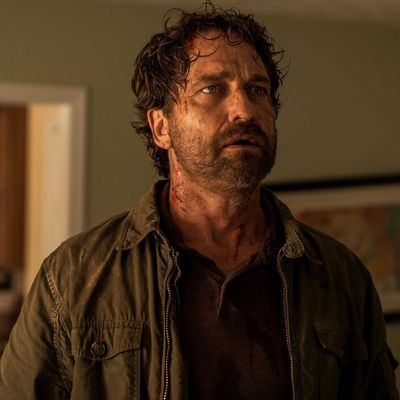
Greenland is the furthest thing you can imagine from the schlock-spectacular Armageddon narratives of a Roland Emmerich or a Michael Bay. We go to those movies to enjoy elaborate mayhem visited upon armies of cardboard characters, but Greenland dares to make its catastrophe feel real and its people feel relatable. It’s just escapist enough to fill our disaster-flick needs, but don’t be surprised if Ric Roman Waugh’s film sometimes feels like too much, especially in the middle of an ongoing real-life calamity. To put it a simpler way: Greenland is not just effective; sometimes it’s too effective.
It also makes for a terrific showcase for star Gerard Butler, who has, over the past decade and a half or so, perhaps become our most accessible movie star, the kind of guy you’re just happy to see onscreen. Butler likes to portray rough average Joes trying to do their best (though he does make the occasional foray into alpha-male spittlefests, most notably in 300 and the dementedly enjoyable Coriolanus). Here, he plays recently separated construction engineer John Garrity, who has eagerly returned to the house from which he was recently kicked out by his wife, Allison (Morena Baccarin), so he can attend their son Nathan’s birthday party. The hot topic of the day is a giant comet called Clarke, which is approaching Earth but will, scientists reassure the world, pass us by. Small chunks of the comet will make it through the atmosphere, however, and John’s neighbors gather around the living-room TV to watch one piece land harmlessly in the Atlantic. Instead, it lands in Tampa, wipes out a good chunk of Florida, and suddenly, as they say, shit gets real. As someone who makes buildings, John discovers he’s been chosen — by some faceless, mechanical government bureaucracy — to be flown out with his family via secret military transport to an undisclosed bunker, where a small number of humans will shelter against what it now seems clear will be an extinction-level event. (You get one guess as to where this secret bunker turns out to be.)
That could be just one story line in any multicharacter disaster extravaganza (as a matter of fact, it’s not dissimilar to one story line in Emmerich’s 2012), but Greenland has more in common with Rod Serling than it does with Irwin Allen. When John’s neighbors find out that he’s been selected for survival and they haven’t, they implore him to take them with him, or at least take their kids. Director Waugh embraces and extends the drama without turning anyone into a convenient villain: These are just confused, scared people who don’t know what to do. That idea governs much of Greenland. This is not a Wouldn’t it be awesome if … movie; this is a Wouldn’t it totally suck if … movie.
But it’s also strangely optimistic. As the Garritys’ journey takes them across a wide swath of the country, the film presents us with a society that is simultaneously crumbling to pieces and, in certain corners, functioning surprisingly well. Strangers are kind when you least expect and most need them to be. (Some are less so; this is, after all, still a disaster movie.) Military bases, filled with soldiers who themselves haven’t been selected for survival, function with doomed, can-do efficiency. Everyone has a story, from a seemingly helpful couple on the highway, to a transportation coordinator at an airfield, to some random guys on a truck. A delightfully leathery Scott Glenn pops in as Allison’s father. Holt McCallany shows up, as he’s wont to do. Waugh and writer Chris Sparling seem to understand that narrative conveniences won’t feel like narrative conveniences if you bother to make them actual characters, a lesson not every Hollywood filmmaker learns.
Waugh is quickly becoming our most foremost auteur of Movies That Had No Business Being This Good. He somehow turned Angel Has Fallen, the third (and, I believe, the cheapest) entry in the Has Fallen series (also starring Butler), into something worth celebrating, and he can also lay claim to having given the Rock his best role, in the tense, moving trafficking drama Snitch. The director’s attention to ground-level detail serves him well in the action arena — with both things like fights (there’s a nice little truck throwdown in Greenland) and ratcheting up tension. The first indications in this movie that something is amiss are a glimpse of a distant armada of jets in the sky and an automated phone call received in the middle of a supermarket run. That may not sound like much, but I kept thinking, This is how it would happen. As the Garritys continue on their increasingly desperate path, they try to maintain their composure around young Nathan, which any parent can relate to. Even the occasional TV and radio broadcasts, going from gee-whiz news stories to sensationalist exploitation to somber scientific pronouncements to fuzzy recorded messages, feel real. The whole damn thing feels real. Which is both a wonderful surprise and a hell of a betrayal for any of us who just wanted to see Gerard Butler fight a comet named Clarke.
More Movie Reviews
- The Accountant 2 Can Not Be Taken Seriously
- Another Simple Favor Is So Fun, Until It Gets So Dumb
- Errol Morris Has Been Sucked Into the Gaping Maw of True Crime


